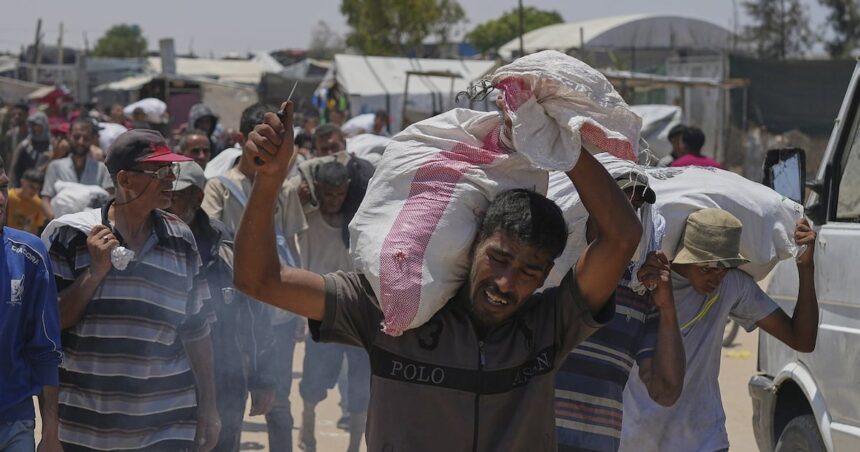I stepped into the echoing chamber of the United Nations General Assembly yesterday afternoon, where the tension was palpable as delegates prepared for what many observers called the most significant Gaza vote since October 7th. The resolution, demanding an immediate humanitarian ceasefire, unconditional release of all hostages, and unhindered humanitarian access, passed with 153 nations in favor—a substantial increase from the 121 votes supporting a similar measure in October.
The atmosphere shifted noticeably when the electronic board lit up with the final tally: 153 in favor, 10 against, with 23 abstentions. Applause erupted from multiple delegations, particularly from Arab states who had championed the measure. The United States and Israel were among the small minority voting against.
“This overwhelming vote sends a clear message that cannot be ignored,” Palestinian Ambassador Riyad Mansour told me after the session, his voice breaking slightly. “The international community demands an end to this catastrophe.”
The resolution comes amid dire humanitarian conditions in Gaza. According to the Gaza Health Ministry, over 18,000 Palestinians have been killed since the conflict began following Hamas’ October 7 attack on Israel that killed 1,200 people and saw 240 taken hostage.
Richard Gowan, UN director at the International Crisis Group, explained the significance of the increased support. “The jump from 121 to 153 votes reflects growing global frustration with both the scale of suffering in Gaza and the diplomatic impasse,” he said. “But the real question is whether this translates to meaningful pressure on parties to the conflict.”
Unlike Security Council resolutions, General Assembly measures are not legally binding. Yet diplomats argue they carry significant moral weight and reflect global sentiment. The resolution specifically calls for “immediate, unconditional release of all hostages” while demanding a “humanitarian ceasefire that must be respected by all parties.”
Walking through the corridors after the vote, I encountered Sweden’s UN Ambassador who characterized the result as “a victory for multilateralism in its purest form.” Sweden was among several European nations that shifted their position from abstention in October to supporting this resolution.
The U.S. defended its opposition, with Ambassador Linda Thomas-Greenfield telling delegates, “While we strongly support humanitarian pauses to ensure aid reaches civilians, any ceasefire that leaves Hamas in place will only sow seeds for the next war.” She emphasized ongoing American diplomatic efforts toward a sustainable peace.
I witnessed Israeli Ambassador Gilad Erdan forcefully tearing up the resolution at the podium, declaring, “This means nothing to us.” His dramatic gesture underscored Israel’s position that military operations will continue until Hamas is eliminated and all hostages returned.
The World Food Programme reports that 90% of Gaza’s population is experiencing emergency levels of hunger. Aid workers I’ve spoken with describe increasingly desperate conditions, with Philippe Lazzarini, Commissioner-General of UNRWA, telling me by phone, “Every day without a ceasefire means more civilian deaths, more destroyed infrastructure, and deeper humanitarian suffering.”
Austria, which shifted from opposing to abstaining, exemplifies the evolving positions of several nations. “We maintain support for Israel’s right to self-defense while recognizing the catastrophic humanitarian situation requires immediate action,” Austria’s representative told assembled media.
The resolution garnered support from countries rarely aligned on Middle East issues. India, which abstained in October, voted in favor this time, signaling growing concern about regional stability.
Several diplomats highlighted the resolution’s balanced approach in addressing both the hostage crisis and humanitarian catastrophe. Egypt’s Ambassador emphasized to me, “This isn’t about taking sides but about ending civilian suffering and creating conditions for eventual peace.”
Beyond the immediate ceasefire demand, the resolution calls for “compliance with international law” by all parties and urges “unhindered provision of humanitarian assistance” into Gaza.
While observers debate the resolution’s practical impact, it represents the strongest expression of global consensus on the conflict to date. The critical question remains whether the vote will translate into actual changes on the ground, where bombs continue to fall and hostages remain in captivity.
As night fell on UN headquarters, delegates dispersed to communicate results to their capitals. What seems clear is that while the diplomatic gap between the United States, Israel and much of the world has widened, the path to ending this conflict remains as elusive as ever.
Reporting from the United Nations, I’m struck by how the formal diplomatic language barely contains the raw emotion underlying this vote—a reflection of both the horror of the October 7 attacks and the ongoing catastrophe unfolding in Gaza’s crowded streets and hospitals.






